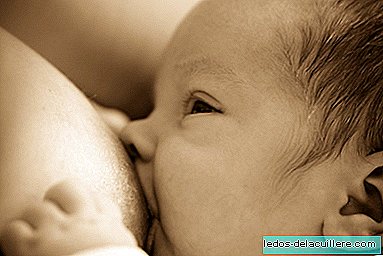
Although we tend to worry about other aspects of health during pregnancy, such as nutrition or skin, pregnancy can also bring changes in the eyes that affect eyesightEven if they are not treated properly, they can trigger visual illnesses.
The ocular system can be altered because there are hormonal changes, and a discomfort as frequent as fluid retention can affect eyesight. Especially if you have already had eye problems, it is important to keep adequate control during pregnancy and go to some revision.
Eye edema
The increase in blood volume and changes in its properties cause fluid to accumulate in the tissues. Therefore, swelling of the ankles and feet is common, although the hands and face may also be affected. In this context it may arise eye edema, which can cause mild blurred vision.
If frequent and prolonged headaches, inflammation, acute pain under the ribs, or vomiting problems, blurred vision or vertigo occur next to swelling of the extremities, we may have symptoms of preeclampsia, so you should go to the gynecologist immediately .
Myopia during pregnancy
In addition, during pregnancy some women who have never had myopia may present it and those who have preexisting myopia may experience an increase: approximately 10% of women, myopia gets worse in pregnancy. It is convenient to check the graduation of the glasses if the changes are large, and avoid tasks such as night driving if there are vision problems.
In the case of women with high myopia, they are predisposed to suffer retinal detachment, especially in the peripartum period and in childbirth, although it is not a common condition.
There are several types of retinal detachment, and the resolution of the process will depend on the degree of macular involvement, in some cases laser therapy or even surgery. In cases of pregnancy, the resolution is usually spontaneous at the end of the third trimester or after delivery, with recovery of visual acuity.
And in most women, myopia returns to normal a few months after giving birth. However, in about 20% of cases, refraction can remain after delivery.
Retinopathy in pregnancy
Retinopathy is a non-inflammatory disease that affects the retina, and one of the most common retinopathies is diabetic retinopathy, a complication of diabetes. Diabetic retinopathy It is a disease of the small vessels of the retina, which is the layer that covers the back of the eye and perceives light.
The progression of pregnancy-induced diabetic retinopathy can be a threat to eyesight. Therefore, diabetic pregnant women should have regular check-ups, since up to 30% of previous diabetics develop retinopathy during pregnancy.
In short, we must be alert to any symptoms that affect our vision and if they are continued go to the specialist. The key to proper visual health during pregnancy is to adopt preventive measures, such as avoiding fluid retention, and maintaining adequate control.












